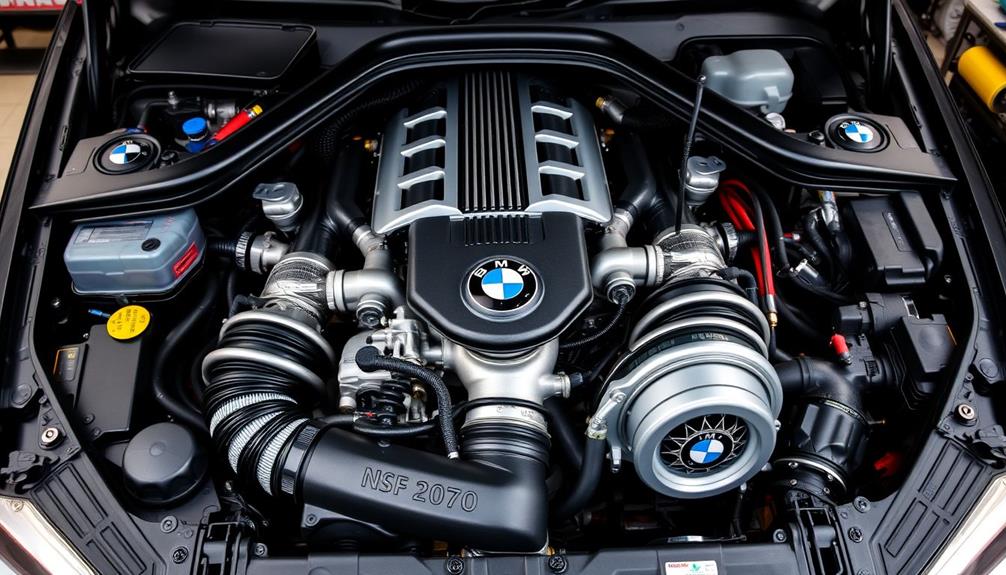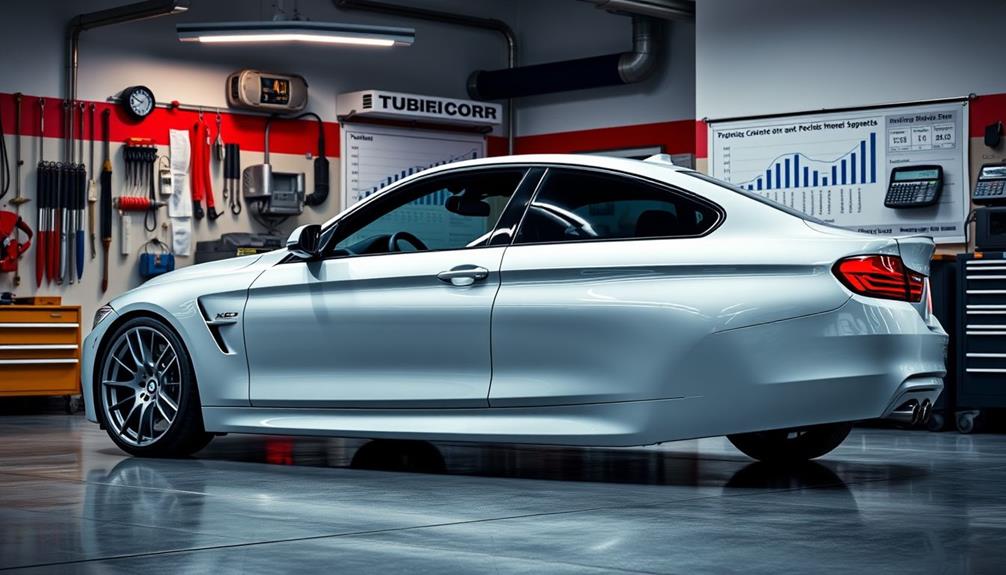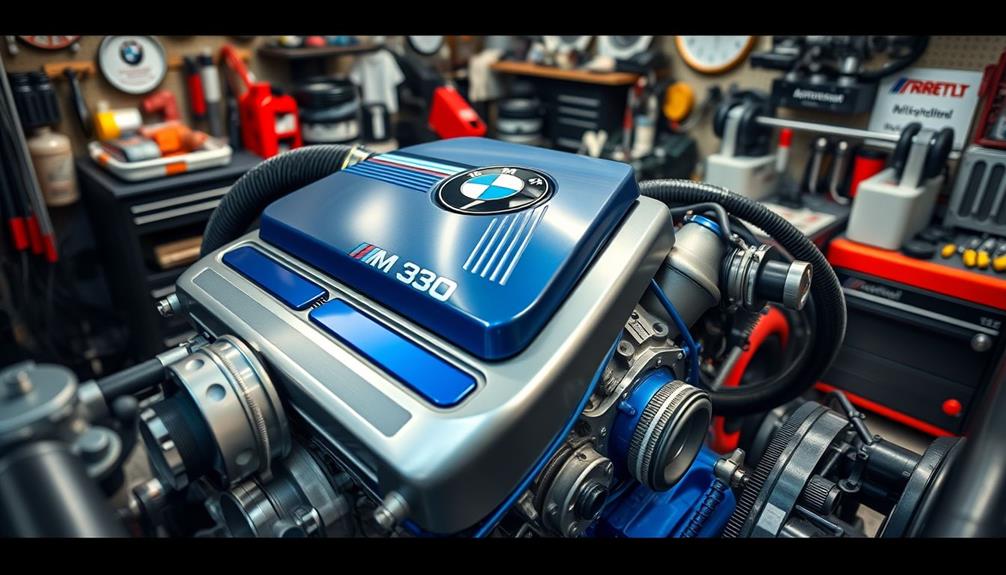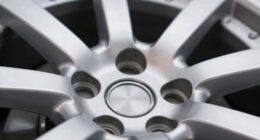To get the most out of your BMW N54 engine, start with an ECU remap for a significant boost in horsepower and torque. Upgrading your intercooler and downpipes can maximize airflow and reduce turbo lag. Consider installing high-quality fuel injectors, like the Index 12 models, to guarantee consistent performance. Regular maintenance, including oil changes and checks for oil leaks, is essential for longevity. Monitor your boost levels to maintain safe operation. Engaging with the vibrant aftermarket community will also open doors to more tuning solutions and performance parts that can elevate your driving experience. There's so much more to explore.
Key Takeaways
- Upgrade your ECU through remapping to gain around 60hp and 80 lb-ft of torque for improved performance.
- Install aftermarket components like upgraded intercoolers and downpipes to enhance airflow and reduce back-pressure.
- Regularly maintain your engine with oil changes every 5,000 to 7,500 miles using synthetic oil for optimal longevity.
- Monitor boost levels and routine checks on turbochargers to prevent potential damage from wastegate rattle.
- Invest in high-quality fuel injectors, especially Index 12 models, to ensure consistent performance and reliability.
Overview of BMW N54 Engine
The BMW N54 engine, introduced in 2006, marked a significant shift in BMW's approach to performance with its twin-turbocharged design. As BMW's first mass-produced twin-turbo gasoline engine, it made its debut in the E92 335i, generating an impressive 306 horsepower and 295 lb-ft of torque. This twin-turbo setup features two small turbos aimed at reducing turbo lag, which was a revolutionary innovation for the brand.
When you dive deeper into the N54's performance potential, you'll find that its most powerful variant, the E82 1M Coupé, pushes the limits further, producing 340 horsepower and 369 lb-ft of torque thanks to overboost technology.
However, it's crucial to be aware of the reliability issues associated with the BMW N54 engine. Many enthusiasts report problems like oil leaks and high-pressure fuel pump failures, creating a mixed reputation among owners.
Fortunately, the aftermarket scene has responded, offering solutions that address these common issues. With the right upgrades and maintenance, you can enhance your ownership experience and fully enjoy the potential of this remarkable engine.
Key Differences Between N54 and N55

When comparing the BMW N54 and N55, you'll notice key differences in turbocharger design, reliability, and tuning potential.
The N54's twin-turbo setup offers quick spool times, while the N55's single twin-scroll turbo enhances performance at lower RPMs.
Understanding these distinctions can help you make informed choices for your tuning journey.
Turbocharger Design Differences
In recent years, enthusiasts have debated the turbocharger design differences between the BMW N54 and N55 engines. The N54 engine features a twin-turbo setup, utilizing two small turbos that effectively reduce turbo lag. This design allows for quicker spool-up and potentially higher peak power output, making it appealing for tuning.
On the other hand, the N55 employs a single twin-scroll turbocharger that enhances efficiency and performance at low to medium RPMs.
While both engines share identical internal dimensions and compression ratios, the N55's turbo system incorporates Valvetronic technology, offering better throttle response and reduced emissions. This simpler design translates to fewer components, resulting in a lower likelihood of failure compared to the N54's more complex twin-turbo arrangement, which has been linked to reliability issues like wastegate rattle.
For tuning potential, the N54 might seem more attractive due to its twin turbos, but the N55's responsiveness and efficiency shouldn't be overlooked.
Ultimately, the choice between these two engines depends on your performance goals and how much reliability matters to you in your tuning journey.
Reliability and Maintenance Issues
Reliability and maintenance issues vary considerably between the BMW N54 and N55 engines. The N54 engine has a reputation for several historical reliability problems, including oil leaks, water pump failures, and turbo wastegate rattle.
In contrast, the N55 was designed to mitigate some of these concerns, but it still faces its share of issues, such as leaking valve covers and VANOS solenoid failures.
A major recall in 2010 for the N54 due to High-Pressure Fuel Pump (HPFP) failures underscores its vulnerability. While the N55 generally shows improved reliability, both engines require regular maintenance to prevent overheating.
The N54 is particularly prone to oil leaks from multiple gaskets, which can lead to costly repairs if not tackled promptly.
The N54's fuel injectors are also a known weak point; however, the latest Index 12 injectors offer better reliability than earlier versions.
The N55, while more robust, also encounters issues with fuel system components.
Performance Tuning Potential
Tuning potential for the BMW N54 and N55 engines reveals notable differences that enthusiasts should consider. The N54, with its twin-turbo setup, is renowned for its significant tuning capabilities, often yielding up to 60hp and 80lb-ft gains through remapping. In contrast, while the N55's single twin-scroll turbo also delivers impressive performance gains, it typically falls short of the N54's output. For those considering tuning your BMW 335i 2008 engine, it is important to note that the N55 does have some advantages over the N54, such as improved fuel efficiency and reduced turbo lag. However, the N54 remains a favorite among many enthusiasts due to its higher potential for power gains. Ultimately, the decision of which engine to tune will depend on individual preferences and priorities.
With performance modifications like upgraded intercoolers and exhaust systems, the N54 frequently achieves over 500hp with hybrid turbo setups, compared to around 470hp for the N55. The N54's direct fuel injection design allows for dyno results showing up to 10% more horsepower than factory ratings, whereas the N55's Valvetronic technology enhances throttle response and fuel efficiency.
When it comes to tuning options, both engines benefit from ECU remapping. However, the N54 generally enjoys a stronger aftermarket support network, leading to a vibrant tuning community.
While both engines can handle significant boost levels, the N54's historical reliability issues have prompted the development of extensive aftermarket solutions to guarantee safe and effective high-performance tuning.
Tuning Options for N54

When you consider tuning options for your N54, ECU remapping stands out as a highly effective choice, boosting horsepower and torque considerably.
You might also explore aftermarket component upgrades like intercoolers and downpipes, which enhance airflow and overall performance.
Each option can elevate your driving experience, but it's crucial to weigh the benefits and guarantee your setup remains reliable.
ECU Remapping Benefits
Over time, many BMW N54 owners have discovered the significant advantages of ECU remapping. This tuning option can yield impressive performance gains, enhancing your driving experience markedly. You might see an increase of about 60 horsepower and 80 lb-ft of torque, which translates to a more responsive engine.
Plus, you can complete the remapping process in roughly an hour using an ENET cable and a laptop, with easy-to-follow instructions.
Here are some key benefits you can expect from ECU remapping:
- Improved performance: Boost your horsepower and torque for a thrilling ride.
- Fuel consumption savings: Enjoy around 10% better fuel efficiency, saving you nearly $190 annually over 15,000 miles.
- Cost-effective: Compared to other tuning options, ECU remapping offers significant performance gains without breaking the bank.
- Regular maintenance: It's essential to keep up with maintenance to guarantee peak performance and longevity, especially with higher boost levels.
With these benefits in mind, ECU remapping is a game-changer for enhancing your BMW N54's performance and efficiency.
Aftermarket Component Upgrades
Once you've experienced the benefits of ECU remapping, it's time to explore aftermarket component upgrades that can further elevate your BMW N54's performance.
One of the most effective modifications is upgrading your downpipes to de-cat options. This change greatly reduces back-pressure, enhancing both horsepower and torque output.
Next, consider installing performance air intakes. These upgrades improve airflow into the engine, leading to better combustion and increased power when combined with other modifications.
To support high horsepower builds, upgraded fuel injectors are essential. The latest Index 12 injectors offer improved reliability over earlier versions, ensuring consistent performance.
Additionally, an upgraded intercooler is vital for managing intake temperatures under increased boost pressure. This helps maintain performance and engine longevity, especially when pushing your N54 to its limits.
Performance Enhancements After Tuning

Tuning your BMW N54 can release impressive performance enhancements that elevate your driving experience.
With proper N54 tuning, you can expect power gains of around 60 horsepower and 80 lb-ft of torque. This significant boost transforms your vehicle's responsiveness and overall performance on the road.
Consider the following benefits after tuning:
- Improved fuel efficiency: A 10% improvement in fuel consumption could save you nearly $190 annually over 15,000 miles.
- Lower engine temperatures: Enhanced tuning helps reduce heat, increasing your engine's reliability and longevity.
- Upgraded components: Adding performance exhaust systems and intercoolers can push your N54's power levels to over 400hp, especially with hybrid turbo setups.
- Regular monitoring: Keeping an eye on boost levels is vital to guarantee safe operation and prevent damage from the increased power output.
Common Reliability Issues

While the performance enhancements from tuning your BMW N54 can be exhilarating, it's important to be aware of the common reliability issues that can arise. One of the most frequent problems is oil leaks, particularly from the oil filter housing, oil cooler, and valve cover gaskets.
You'll likely find yourself replacing these gaskets multiple times throughout your ownership.
Another major concern is the high-pressure fuel pump (HPFP) failure, especially in earlier models. This can lead to long crank times or even engine stalling, which is frustrating for any driver.
Additionally, keep an ear out for turbo wastegate rattle; this symptom often indicates future turbo failures. Addressing it early with aftermarket repair kits or replacements can save you headaches later.
Lastly, the fuel injectors in the N54, particularly the earlier versions, are known for their failures. If you're facing this issue, consider upgrading to the later Index 12 injectors, which offer improved reliability—though a full set replacement can cost around $3,514.
Staying informed about these reliability issues will help you enjoy your tuned N54 without unexpected setbacks.
Maintenance Tips for Longevity

To keep your BMW N54 running smoothly for years to come, regular maintenance is essential. By following a few key practices, you can guarantee your engine stays in top shape and performs at its best.
- Schedule regular oil changes every 5,000 to 7,500 miles, using synthetic oil to prevent wear and tear.
- Upgrade the water pump and thermostat proactively, as these are known failure points that can lead to overheating.
- Invest in high-quality fuel injectors, especially the latest Index 12 models, to enhance reliability and performance, particularly if you're pushing for higher horsepower.
- Conduct routine checks of the turbochargers for any signs of wastegate rattle or wear to avoid costly replacements.
Additionally, keep an eye on gaskets, especially for the oil filter housing and valve cover, to prevent common oil leaks.
By staying on top of these maintenance tips, you'll not only extend the life of your N54 but also enjoy a more reliable and powerful driving experience.
Prioritizing these aspects will lead to fewer headaches and a more enjoyable ownership experience.
Aftermarket Support and Community

The BMW N54's vibrant aftermarket support and passionate community make it easier than ever for enthusiasts to enhance their vehicles. You'll find a wealth of performance parts and tuning solutions tailored to boost your engine's power and reliability. Brands like Vargas Turbo Technologies (VTT) are especially popular, addressing common turbo and wastegate issues while offering upgraded turbo options for those seeking more power.
Engaging with the N54 enthusiast community on forums like BIMMERPOST provides invaluable insights. You can share experiences, ask for recommendations, and learn about effective maintenance and performance modifications. Many members report impressive gains—up to 80hp and 100lb-ft torque—from tuning options like ECU remapping and aftermarket exhaust systems.
Here's a quick overview of key aftermarket support options available for your N54:
| Category | Example Brands |
|---|---|
| Turbo Upgrades | Vargas Turbo Technologies |
| Exhaust Systems | Remus, Active Autowerke |
| ECU Tuning | JB4, MHD Tuning |
| Intercoolers | VRSF, Mishimoto |
| Fuel System Upgrades | Walbro, Injector Dynamics |
In this community, regular maintenance and quality components are essential for long-term reliability.
Financial Considerations for Tuning

Tuning your BMW N54 can be an exciting venture, but it's vital to understand the financial commitments involved. The costs can add up quickly, with total expenses for upgrades and repairs potentially reaching $7,500.
Here are some key financial considerations to keep in mind:
- Basic tuning options, like remapping, usually cost around $400 to $450, giving you a solid power boost of about 60hp and 80lb-ft of torque.
- If you're aiming for more significant enhancements, major modifications such as upgraded twin turbos can run you around $2,000, while a single turbo setup might exceed $7,000.
- Don't forget about fuel injector replacements; upgrading for higher horsepower builds can set you back approximately $3,514 for a full set.
- Regular maintenance is essential post-tuning. You should budget for routine oil changes and monitor your engine health to guarantee reliability.
Understanding these financial investments will help you make informed decisions and enjoy the performance boosts your N54 can deliver.
Proper planning will keep your tuning project on track without breaking the bank.
Frequently Asked Questions
How to Make More Power in N54?
To make more power in your N54, consider ECU remapping, upgrading the exhaust system, and installing hybrid turbos. Don't forget high-flow fuel injectors and an intercooler to support those gains while ensuring regular maintenance.
How Much Horsepower Does a BMW 335I N54 Twin Turbo Have?
As the saying goes, "There's no place like home." Your BMW 335i's N54 engine boasts a factory-rated output of 306 horsepower. With tuning, you can release even more power and enjoy thrilling performance.
What Is the Max Boost on a Stock N54 Turbo?
The maximum boost on a stock N54 turbo is around 14.5 psi. For peak performance, you should aim for 16-18 psi, but be cautious not to exceed 24 psi to avoid potential engine damage.
How Long Do N54 Turbos Last?
Imagine cruising smoothly, knowing your N54 turbos might last 70,000 to 100,000 miles. With proper care, like regular oil changes, you can extend their lifespan, avoiding costly replacements and enjoying thrilling drives longer.
Conclusion
In summary, tuning your BMW N54 can release incredible performance and transform your driving experience. With the right upgrades, you can enjoy the thrill of enhanced power and responsiveness. But isn't it worth considering the balance between performance and reliability? By staying informed about maintenance and potential issues, you can guarantee your N54 runs smoothly for years to come. Embrace the aftermarket support and community to make the most of your tuning journey!









